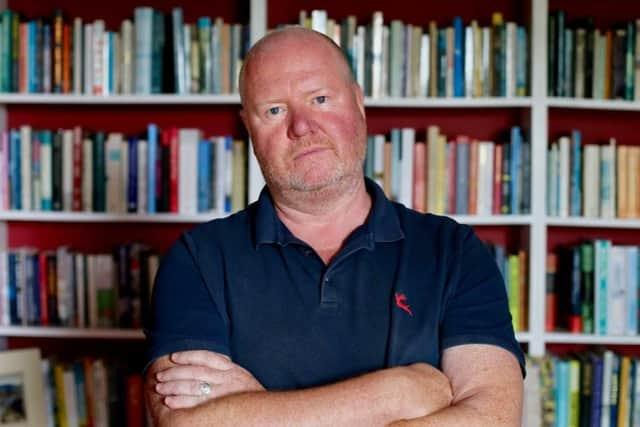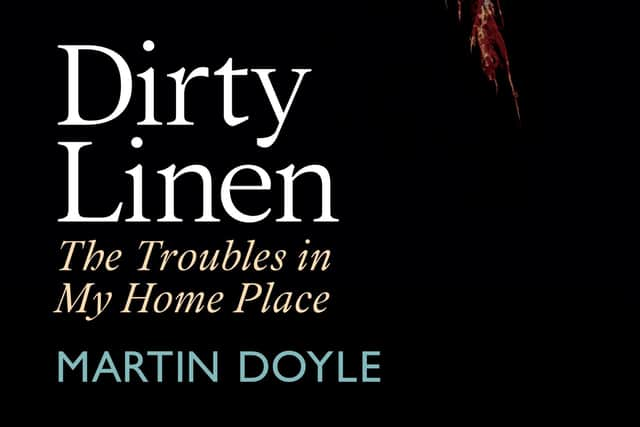A small rural parish in Co Down, which suffered terribly through The Troubles, is the backdrop to a personal and compelling journey through history by native Martin Doyle
This article contains affiliate links. We may earn a small commission on items purchased through this article, but that does not affect our editorial judgement.
and live on Freeview channel 276
‘Dirty Linen’ is Irish Times Book Editor Martin Doyle’s very deep exploration of the impact of the Troubles on his native parish, a personal journey he undertook to understand the grief of others following the death of his wife Nikki to cancer. With three young children and dealing with grief, he began to look into those people in the parish who had been blighted with unimaginable suffering following the murders of their loved ones.
"Victims and their families are at the heart of this book. Any sadness I felt was as nothing compared to the lifelong grief of the neighbours who were sharing their stories. I believe that the very least I – we – owe them is our time, the time it takes to listen to what they went through and are still going through,” Martin writes.
Advertisement
Hide AdAdvertisement
Hide AdTullylish is right in the heart of the Linen Triangle with the River Bann meandering through as it makes its way to Portadown and Lough Neagh. It also became part of the Murder Triangle during The Troubles with devastating news darkening many doors in the parish over the 30 years and more of conflict.


His first chapter deals with the final two murders in the parish which happened less than a year before the ceasefires and ‘were two of the most shocking’. Gerard (22) and Rory (18) Cairns were murdered in their living room just hours after their little sister Roisin celebrated her 11th birthday. “The brothers ‘never had a bitter word or a cross word to say of anyone’, a neighbour told the Lurgan Mail. “I grew up with them, spent every day of the last 20 years with them. I can’t believe it has come to this. It’s small comfort to the family but the people who did this will have to answer to God.” Martin writes: “Three decades on, and no one has ever been charged with the murders. To those who might ask why you would want to reopen old wounds, the answer might be that some wounds have never been allowed to heal. Instead they have been contaminated at every turn.”
-
-


Gerard and Rory’s father Eamon erected a memorial, a simple Celtic cross, in Clare chapel which reads: “This cross was erected in memory of those who were murdered in the Bleary and Ballydougan townlands between the years 1969 – 2006. We remember them in their youth, middle age and old age. That we may bear witness to and draw strength from their ordinary yet exceptional lives.” One of the memorial stones remembers the victims of the bingo bus shooting. A few yards away are the gravestones of Joe, Barry and Declan O’Dowd murdered in their family farmhouse just a few hundred yards from the Cairns family home 17 years before Gerard and Rory’s murders.
With the help of his parents John and Marie, doors normally closed to journalists throughout the decades were opened to Martin as they were neighbours and friends. This book is a caring, honest record of how people felt at their most vulnerable, when grief and horror arrived like a lightening bolt to change their lives forever.
Advertisement
Hide AdAdvertisement
Hide AdMartin writes about his father working for Goodyear and in 1976 his mother was cleaning windows when a neighbour shouted to her someone had been shot at at the Lurgan factory. “My mother burst out crying.” Samuel Gardiner, a 26-year-old Protestant from Lurgan was a passenger in a car driven by a fellow Goodyear employee who was in the UDR when the IRA opened fire as they left the plant.
Martin also recalls youthful memories of when their ‘job’ as children was to stay in the car at Control Zones. And when his parents opened a clothes shop in Banbridge in 1978 – there were news flashes announcing that an incendiary device had gone off in commercial premises with keyholders requested to search their premises. Martin writes: “Lending a hand is one thing, sacrificing one is quite another.”
The Laurencetown native recalls his most famous neighbour Maggie Barry, a singer from the Travelling background who once shared a bill with Bob Dylan at the Newport Folk Festival. He recalls close knit families, the GAA and the mobile library.
Martin, who attended Banbridge Academy and was once a journalist with the Banbridge Chronicle, speaks to Stephen Travers, a survivor of the the Miami Showband Massacre. The band left the Castle Ballroom in Banbridge early on a Thursday morning July 31, 1975 after a great gig but they never made it home. Two of the ‘soldiers’ who had stopped the mini bus Harris Boyle and Wesley Somerville planted a bomb on the bus but it exploded prematurely killing them both instantly. Fran, the lead singer was shot 22 times, Brian 9 times, Tony 4 times and Stephen Travers was hit also but survived. Des managed to hide in long grass playing dead. Stephen moved to London and set up a number of Irish newspapers including the Irish World which Martin Doyle would later write for.
Advertisement
Hide AdAdvertisement
Hide AdDoyle deftly weaves the two strands of history, with ‘the decline of the local linen industry serving as a metaphor for the descent into communal violence, but also for the solidarity that transcended the sectarian divide’.
Interviews with former classmates and neighbours who were deeply affected by the conflict, survivors of the most horrific sectarian attacks, both Catholic and Protestant, all share their poignant stories.
A book launch is to be held in Laurencetown Community Centre on Saturday October 21 at 7pm where Martin will be in conversation with Stephen Walker. There will also be a launch on October 26 at the F.E. McWilliam Gallery at 7pm when Martin will be in conversation with Jason Diamond.
The Belfast launch is on November 1 at the Linen Hall Library with Martin in conversation with Brian Rowan.
Reviews
‘This is the finest memoir of the conflict I’ve ever read.’ – Fergal Keane
‘Brilliantly written, fully human, hard to read and harder to put down – everyone should read this book.’ – Anne Enright
‘I have read many books about Northern Ireland, but I’ve never read anything like this; it’s electrifying … historical, political, artistic, Dirty Linen is a phenomenal work.’ Martina Evans
‘All of us with Ulster family, and everyone who cares about Ireland, needs to read this fascinating, powerful, utterly moving book.’ Joseph O’Connor
‘Superb, a really important and moving work that brings the reality of the Troubles to life and restores the human tragedy to its proper place in public memory … a vital, potent and moving piece of work.’ Fintan O’Toole
About the author